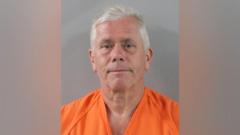Miguel Uribe, a Colombian senator and presidential candidate, has died two months after being attacked at a campaign rally, reigniting fears of political violence in the country.
Senator Miguel Uribe's Tragic Death: A Reflection of Violence in Colombian Politics

Senator Miguel Uribe's Tragic Death: A Reflection of Violence in Colombian Politics
Colombia mourns the loss of a promising political figure following the shooting of Senator Miguel Uribe.
Colombian Senator Miguel Uribe, a rising star in the Democratic Centre party and a hopeful for the presidency in 2026, has passed away two months after sustaining severe injuries from a shooting at a political event in Bogotá on June 7. The 39-year-old was shot in the head and leg by an assailant during a campaign rally, which shook the nation and raised concerns about the ongoing political violence in Colombia.
Uribe's wife, María Claudia Tarazona, announced his death on social media, praising him as "the love of my life" and a devoted father. Although a 15-year-old suspect has been detained, the motives for the attack remain unknown. Following the senator's death, President Gustavo Petro extended condolences to Uribe's family, recognizing the profound impact of this tragedy.
Since his hospitalization, Uribe underwent multiple surgeries due to complications from the gunshot wounds, including pressure on his central nervous system. His plight garnered widespread public support, reflected through vigils and silent marches as Colombians rallied for his recovery.
Uribe's shooting mirrors the tumultuous history of political assassinations that plagued Colombia during the late 20th century. It also harkens back to the kidnapping and death of Uribe's mother, Diana Turbay, a journalist who was killed during a failed rescue attempt by authorities while held captive by a drug cartel.
Despite a significant reduction in crime rates since the signing of a peace agreement with FARC in 2016, violence remains a critical concern in the country, especially for politicians and social leaders. The current homicide rate stands at 25.4 per 100,000 inhabitants, a notable decrease from historical highs, but still among the highest in South America.
With Uribe's death, analysts suggest a potential shift in the political landscape, possibly empowering right-wing politicians who can leverage sentiments around security. Vice-President Francia Márquez has called for national unity to reject violence, emphasizing that democracy should be fostered through dialogue, not violence.
The aftermath of Uribe's assassination has drawn global attention, with figures like US Secretary of State Marco Rubio vocally demanding accountability for those responsible. As Colombia grapples with this tragedy, the nation reflects on its past while contemplating its political future amid continuing unrest.

















